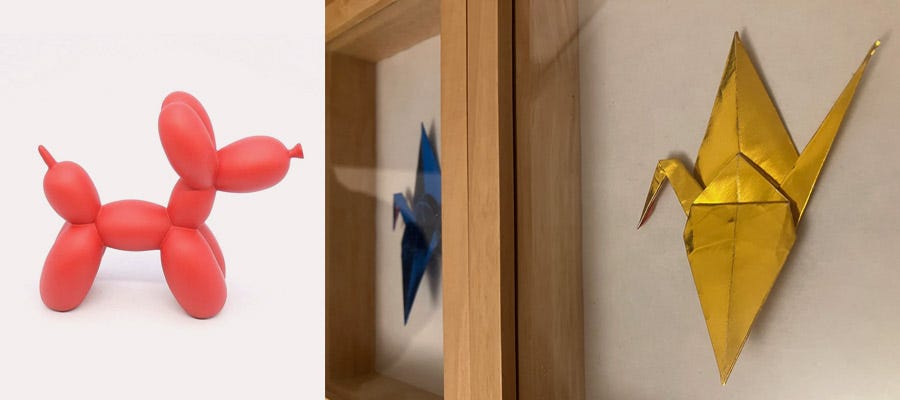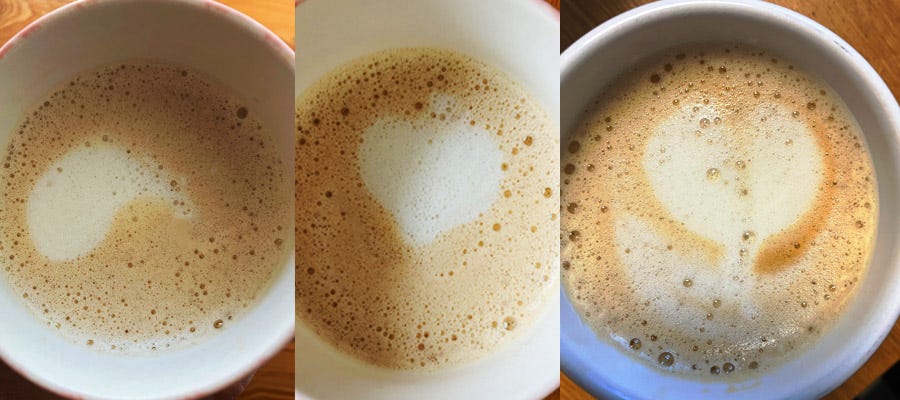Useless Skills (And Why You Need Them)
Collecting side hobbies and party tricks is far from a waste of time.
Note: paid subscribers will find the audio edition of this issue in a separate email.
Think back to a time when you were a young kid and a classmate said, “Look what I can do!” You looked, right? Sometimes, you saw something stupid, sometimes something funny; most often, you saw something unimpressive. But on those rare occasions when you saw something special or truly weird, you probably remembered it for a long time.
Many years later, that strange talent or trick might be all you remember about that person. And how many kids from back then have you forgotten? The majority, I’ll bet.
We may think it’s a waste of time to develop what are often labeled as “useless” skills. I would argue that you can never learn too many. Here are some of mine:
Juggling
Folding an Origami flapping bird (amongst other models)
Landing an “Ollie” on a skateboard
Doing a handstand
Making balloon animals (mainly 🐕 and 🦒)
Doing a backspin (evidence presented above)
Playing a popular song on the guitar
Remembering (and happily telling) many, many jokes
Dancing the basics (Waltz, Swing, Foxtrot, Salsa, Rumba)
Writing basic calligraphy
Making playing cards appear under somebody’s behind while they are seated next to me. Believe me, people remember this one.
This bit of legerdemain (above) is one of the first things I practiced when starting with cards.
I have surely spent thousands of hours over the course of my life developing these random diversions, distractions, and divertissements. Why?
First of all, I love the satisfaction that comes from learning new skills, especially if they can be used to entertain others. I like knowing that I can do just enough of something to be better than average; I rarely aim for mastery. And this goes back to what I have written in this newsletter about combatting perfectionism: “good enough” is usually good enough to get the job done. And I’d say this goes double for the assortment of hobbies and party tricks I have in my back pocket. Picking up three apples and juggling them is enough to elicit some smiles and enthusiastic comments from the average friend or stranger. You don’t need to juggle five.
And hey, if you can make just ONE balloon animal? You’re a superstar at any kid’s birthday party (and other parents will often be disproportionately impressed).
The second reason, and one that is most relevant for those of you who are freelancers and entrepreneurs, is this: I don’t want to be the kid who is forgettable.
Sure, maybe I overcompensate a bit. In fact, I know I do. But I enjoy all of these little pursuits on their own merits, so they add flavor and fun to my life. No harm done there.
So, how else are such skills useful?
At a holiday party at the design firm where I worked in 2004, the owner of a winery we had just started working with was making his exit. As he approached the door, I stopped him and said, “You want to see something crazy?” I then proceeded to do a classic levitation illusion. He was amazed (and it helped that he probably had a few libations, I’m sure). I shook his hand and made my way back to another corner of the office, leaving him to wonder about what had just happened.
Eight years later, when it came time for him to design a label for one of his new beverages, he tracked me down and gave me the job. Why? He remembered the magic. In fact, the beautiful thing about it (and this goes for most magic tricks, actually), is that he remembered it as being far more spectacular than it actually had been. The illusion had grown, like a legend, in his mind. According to his retelling of the moment to a colleague, I had hovered several FEET above the ground right before his eyes. In reality, it had been maybe three or four inches, which is all the illusion can really achieve. Nevertheless, I had been a junior designer all those years ago with nothing to separate me from the other employees in my position, but I made an indelible impression on this man by doing something weird and unexpected, born out of a hobby I rarely (at the time) got to share with the world.
After practicing close-up magic now for 25 years, I can safely say it has given me more opportunities to bring joy and happiness to others than anything else, save perhaps for my art and teaching. Once, a certain card trick even allowed me to help out the CEO of Adobe in an unexpected way on a big day for the company. More on that some other time!
Magic is memorable not just because it is rarely seen performed under our noses, but because it provides us with that rare sense of wonder and confusion that tends to dissolve and disappear as we get older, more streetwise, and perhaps more jaded. It’s wonderful to be truly surprised by something we can’t explain. If you are the person providing this delightful bewilderment to another, you are difficult to forget.
This is true of any rare skill you share with your fellow humans. Most of our days begin and end in a predictable fashion. Routines are set, followed, and there is rarely any deviation. It’s boring.
But then suddenly, along comes a person with something a little unusual to share and wham! You’re shaken out of autopilot and you have a story to tell at the dinner table. Who would you rather be? The recipient of this gift, or the giver? I have been both and can assert the superiority of the latter.
I have spent more time in doctor’s waiting rooms than I cared to, and in those rooms, I have seen many parents hand their young children a phone to keep them entertained. This always makes me sad; surely there are other ways to stave off boredom. When the mood strikes me, I borrow a piece of printer paper from the receptionist and then ask the parents of these children if I can show them something fun with the paper. With their permission, I proceed to fold an Origami flapping bird or a jumping frog and give it to the child. There is no business to be won, obviously, in this particular scenario. There is, however, a bit of wonder and surprise on behalf of the children. On a basic level, there is also a welcome and pleasant interaction between strangers. And this is another thing certain hobbies and pastimes grant their practitioners: a way to connect, meaningfully, with others. I’ll take more of that wherever I can get it.
As for humor, I have only found it to be an asset in my client and customer interactions. Doom and gloom are everywhere. If you can supply a chuckle here and there, people are grateful. With a bit of practice, you can read the room and select the right witticism, pun, or anecdote to lighten the mood. This is a skill that can bring people to your side, diffuse tension, and even win you business. As I have mentioned before, people want to work with people they like– your resume and credentials are only part of the equation. (Need some material? You are guaranteed to find a suitable joke for every occasion in this book.)
When I speak at conferences and other events, I often use one of these two openers (you’re welcome to borrow them, of course):
I’d like to begin with an old saying: if at first you don’t succeed … skydiving is not for you.
I’d like to start by offering some advice: whatever you do in your life, always give 100%. Unless you’re donating blood.
Neither of these are going to get me an HBO special. They serve only to lighten the mood and break the ice. And that’s enough to get people on your side and give you some of their time.
Dancing? I only know a few basic steps but that’s enough, especially in a world where most of us stand in a circle and shuffle from side-to-side at weddings and parties. Besides, partner dancing is some of the most fun you can have on earth, no question. Try it and report back to me.
Calligraphy? My first paying gig in high school was, as a junior, writing out the names of the senior class on their graduation certificates!
Backspins? Pure party trick and good for laughs, especially the older I get. That’s enough for me.
Guitar? You can learn a few 3-chord songs in a month and immediately raise your social standing when you casually play one of them in the right setting.
Need more convincing? Learning new things is great for your creativity, and better still, it’s great for your brain:
"Embracing a new activity that also forces you to think and learn and requires ongoing practice can be one of the best ways to keep the brain healthy."
— Dr. John N. Morris, director of social and health policy research at the Harvard-affiliated Institute for Aging Research.
By now, I hope it’s clear there is much to be gained from the development of hobbies and skills that can be shared with others. You will be remembered for your efforts, and remembered fondly. This can pay dividends down the road, and even if this is not a guaranteed outcome in every case, you can always rest assured that you made another person feel a little joy or delight. Such feelings are in short supply. How lovely it is—how magical— to be somebody who can conjure them out of thin air!
So what’s next on my list, you ask? I’m learning to make latte art!☕️
Thank you for reading, and happy new year! It’s good to be back.
My goal for year one of this newsletter was to reach 5,000 subscribers. I’m just shy of 4,700 just moving past 4700. Pretty close! It was an arbitrary number to begin with, but I’m glad I am almost there. If you like what I’m doing with The Accidental Expert, you can support me by sharing links to your favorite issues or to the homepage. Or you can let me know in the comments. Or (and for this I would send you a big virtual hug!), you can become a paying subscriber — this means audio episodes and some other goodies down the road (videos, art and more opportunities to connect with me directly). I selected the lowest price Substack allows ($36 for whole year’s subscription), so I hope that helps.
Other ways to support my work:
My digital art shop on Gumroad
Prints and apparel
My meditative tracing book (makes a great gift!)
Until next time, take care of yourselves and each other, remember to be kind, and I’ll say, Ciao for now.
– Kyle
Find me everywhere!








Ha, my "useless skill" is figure skating. It's the thing that keeps my brain happy and at ease, but if I go to a creative conference it's useless haha.
A few of my others are:
- Making fancy charcuterie boards
- making sushi
- household things, like changing smoke alarm batteries
- detailing my car properly
- picking a good bottle of wine
BRUH!!!!! That move was LEGIT! #Respect!